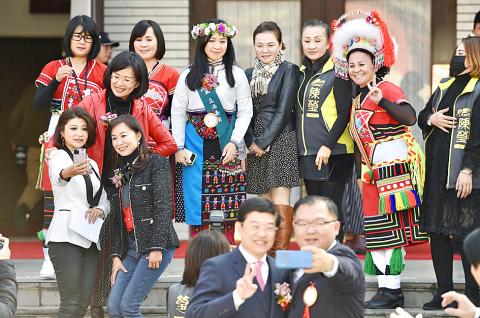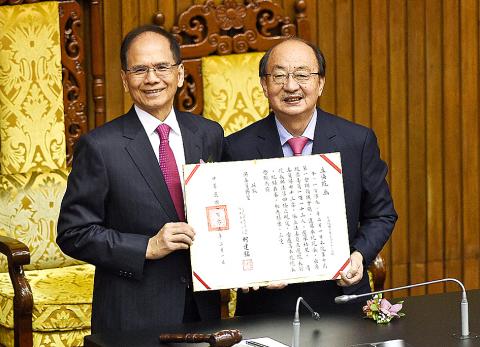Former premier Yu Shyi-kun (游錫堃) was yesterday elected legislative speaker by the Democratic Progressive Party’s (DPP) caucus, while DPP Legislator Tsai Chi-chang (蔡其昌) was elected deputy speaker for a second term.
The legislative speaker election was held at the Legislative Yuan in Taipei after the new lawmakers were sworn in.
Yu, a first-time legislator, garnered 73 votes, while rival Lai Shyh-bao (賴士葆) of the Chinese Nationalist Party (KMT) won 36 votes.

Photo: George Tsorng, Taipei Times
KMT Legislator Yang Chiung-ying (楊瓊瓔) — who was the party’s deputy legislative speaker candidate — Nonpartisan Solidarity Union (NSU) Legislator May Chin (高金素梅) and rookie DPP Legislator Lai Pin-yu (賴品妤) each earned one vote, while a spoiled vote was also cast.
After last month’s legislative elections, the DPP has 62 seats, the KMT has 38, the Taiwan People’s Party (TPP) has five and the New Power Party (NPP) has three, while the NSU and Taiwan Statebuilding Party each have one.
Independent legislators Fu Kun-chi (傅崐萁), Freddy Lim (林昶佐) and Chao Cheng-yu (趙正宇) make up the remaining seats.

Photo: Chen Chih-chu, Taipei Times
In the afternoon’s deputy legislative speaker election, Tsai secured 65 votes, beating out Yang, TPP Legislator Lai Hsiang-lin (賴香伶) and NPP Legislator Claire Wang (王婉諭), who won 36, five and three votes respectively, while KMT Legislator Sra Kacaw and Wen Yu-hsia (溫玉霞) each got one vote.
In Yu’s inauguration speech, he said he hoped Taiwan would become a “normalized” nation, in which the legislature would serve as the pinnacle of its political system, and aims to improve how it functions.
He said he would push to lower the age for people seeking legislative office to break barriers between generations and promote cooperation and prosperity between people of all ages.
Yu said he would encourage his colleagues to work in tandem with government agencies to secure free-trade agreements and establish official ties with like-minded democracies, such as the US, Japan, EU, Australia and Canada, against the backdrop of a US-China trade dispute, which could tilt international relations in Taiwan’s favor.
Taiwan should use its soft power and critical strategic location in the Indo-Pacific region to capitalize on the opportunities that have presented themselves amid the trade dispute, he said.
This, coupled with a robust economy and a strong national defense system, would make Taiwan a small but powerful nation, he added.

The combined effect of the monsoon, the outer rim of Typhoon Fengshen and a low-pressure system is expected to bring significant rainfall this week to various parts of the nation, the Central Weather Administration (CWA) said. The heaviest rain is expected to occur today and tomorrow, with torrential rain expected in Keelung’s north coast, Yilan and the mountainous regions of Taipei and New Taipei City, the CWA said. Rivers could rise rapidly, and residents should stay away from riverbanks and avoid going to the mountains or engaging in water activities, it said. Scattered showers are expected today in central and

People can preregister to receive their NT$10,000 (US$325) cash distributed from the central government on Nov. 5 after President William Lai (賴清德) yesterday signed the Special Budget for Strengthening Economic, Social and National Security Resilience, the Executive Yuan told a news conference last night. The special budget, passed by the Legislative Yuan on Friday last week with a cash handout budget of NT$236 billion, was officially submitted to the Executive Yuan and the Presidential Office yesterday afternoon. People can register through the official Web site at https://10000.gov.tw to have the funds deposited into their bank accounts, withdraw the funds at automated teller

COOPERATION: Taiwan is aligning closely with US strategic objectives on various matters, including China’s rare earths restrictions, the Ministry of Foreign Affairs said Taiwan could deal with China’s tightened export controls on rare earth metals by turning to “urban mining,” a researcher said yesterday. Rare earth metals, which are used in semiconductors and other electronic components, could be recovered from industrial or electronic waste to reduce reliance on imports, National Cheng Kung University Department of Resources Engineering professor Lee Cheng-han (李政翰) said. Despite their name, rare earth elements are not actually rare — their abundance in the Earth’s crust is relatively high, but they are dispersed, making extraction and refining energy-intensive and environmentally damaging, he said, adding that many countries have opted to

PEACE AND STABILITY: Maintaining the cross-strait ‘status quo’ has long been the government’s position, the Ministry of Foreign Affairs said Taiwan is committed to maintaining the cross-strait “status quo” and seeks no escalation of tensions, the Ministry of Foreign Affairs (MOFA) said yesterday, rebutting a Time magazine opinion piece that described President William Lai (賴清德) as a “reckless leader.” The article, titled “The US Must Beware of Taiwan’s Reckless Leader,” was written by Lyle Goldstein, director of the Asia Program at the Washington-based Defense Priorities think tank. Goldstein wrote that Taiwan is “the world’s most dangerous flashpoint” amid ongoing conflicts in the Middle East and Russia’s invasion of Ukraine. He said that the situation in the Taiwan Strait has become less stable